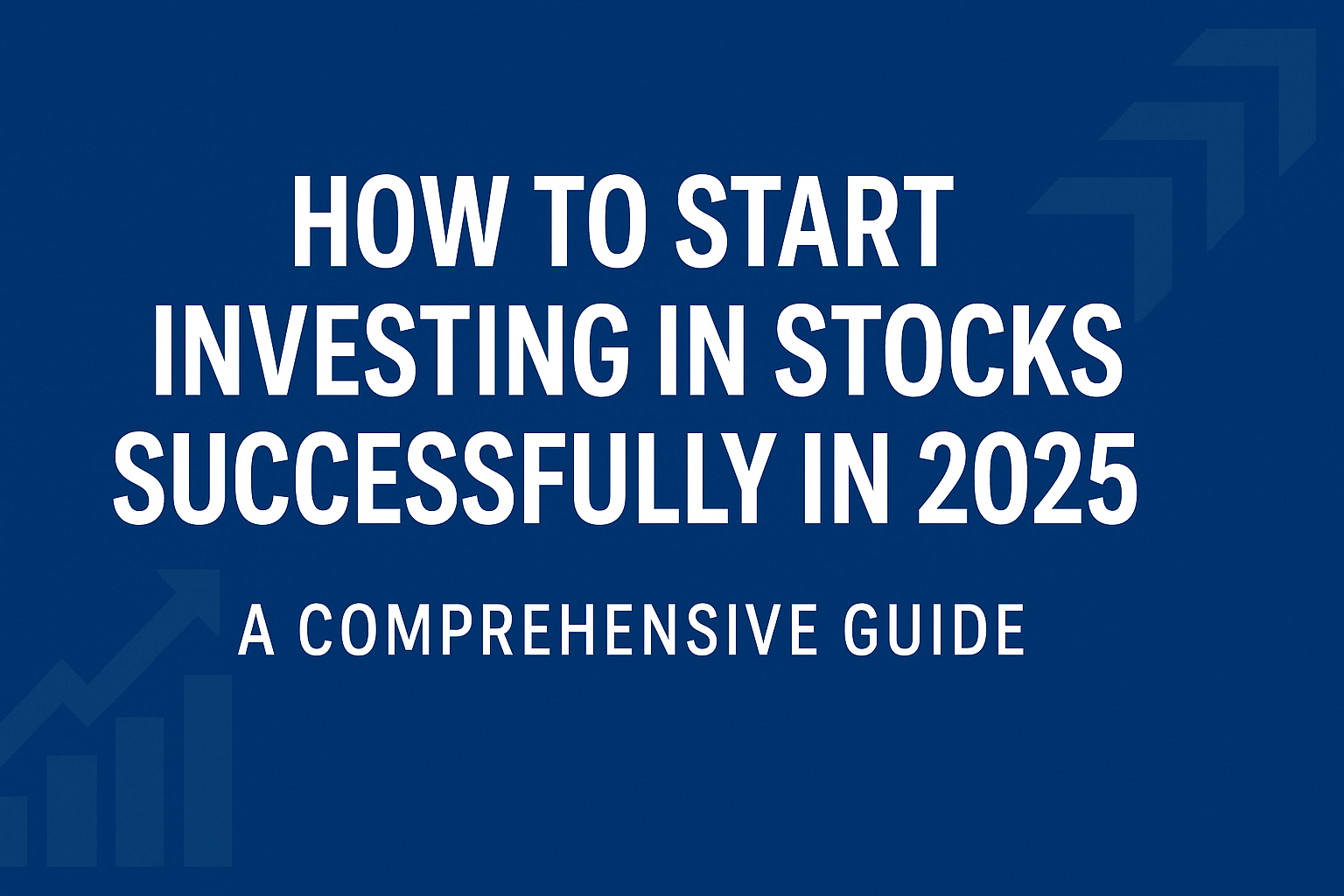Contents
- Beginning
- What is investing in stocks?
- Why Should You Buy Stocks?
- Setting Your Goals for Investing
- How the Stock Market Works
- Different Kinds of Stocks
- Important Words That Every Newbie Should Know
- A Step-by-Step Guide to Getting Started with Investing
- Things You Shouldn’t Do
- Think about index funds or ETFs (a low-risk choice)
- Taxes and Investing in Stocks
- Beginners’ Tools and Resources
- Final Thoughts on Your First Stock Purchase
Beginning
how to start investing in stocks?.

“How to start investing in stocks has never been easier than it is now, in 2025.” Thanks to easy-to-use apps, educational content, and online trading platforms, even complete beginners can make money in the stock market.
Despite its popularity, many myths about stock investing remain. Some people believe that stock investing is solely based on luck. Others believe you need a lot of money to start. The truth is that stock investing is a skill—one that can be learned, improved, and turned into a powerful way to grow your money.
This guide will show you how to confidently start investing in stocks, even if you’ve never done it before. Whether your goal is to save for retirement, generate passive income, or simply grow your money, this article provides the necessary information to start your journey.
What Does It Mean and How to Start Investing in Stocks?
Shares, also called stocks or equities, represent parts of a company that you own. When you buy a share of a company, you are actually buying a small piece of it. The value of your stock may increase if the business expands and generates more revenue. You may also get dividends—a share of the company’s profits.
Buying stocks means putting your money into businesses you believe will grow over time. It’s not guessing or gambling; it’s making smart choices based on research and a plan.
Why Should You Buy Stocks?

If you’re wondering how to start investing in stocks, you’re not alone. Millions of people invest in the stock market for good reasons:
- Long-term growth: Historically, stocks have provided better returns than savings accounts or bonds.
- Compounding returns: Reinvesting your profits can make your money grow a lot over many years.
- Ownership: You actually own parts of the companies you invest in.
- Passive income: Some stocks pay regular dividends, giving you steady income.

But investing in stocks also comes with risks. Prices can go up or down depending on the market, company performance, global events, and investor behavior.
Setting Your Goals for Investing
“How to start investing in stocks begins with knowing your goals.” Before investing, know your “why.” Are you
- Are you saving for retirement?
- Building wealth?
- Are you interested in generating passive income?
- Are you saving for a house or education?
Define your time frame (how long you want to invest) and your risk tolerance (how much loss you can handle without stress). Younger investors often can take more risks since they have time to recover. Older investors or those closer to their goals may want safer choices.
How the Stock Market Works
“Before diving into how to start investing in stocks, it’s crucial to understand how the stock market operates.” In the U.S., two major stock exchanges dominate the market:
- New York Stock Exchange (NYSE)
- NASDAQ
Public companies sell shares on these exchanges to raise money. Investors buy and sell shares through brokers on platforms like
- Robinhood
- Fidelity
- E*TRADE
- Charles Schwab
- Webull
- eToro (global)
Prices move based on supply and demand. If more people want to buy a stock than sell it, the price rises. If more people want to sell, the price falls.
Different Kinds of Stocks
“Not all stocks are the same, and knowing the difference is part of how to start investing in stocks wisely.”
- Common Stocks: Most investors buy these; they represent ownership and usually have voting rights.
- Preferred Stocks: Typically, they don’t have voting rights, but they offer fixed dividends and take precedence over common stocks in case of company liquidation.
- Growth Stocks: Issued by companies expected to grow faster than average; they usually reinvest profits instead of paying dividends.
- Value Stocks: Undervalued companies with strong fundamentals; may provide dividends and price gains.
- Dividend Stocks: Regularly pay a portion of profits to shareholders; excellent for passive income.
Important Words That Every Newbie Should Know
- Share Price: The cost of one share.
- Market Capitalization: Total value of all a company’s shares.
- Dividend Yield: Annual dividends as a percentage of the share price.
- Price-to-Earnings Ratio (P/E): Measures if a stock is over- or undervalued.
- Bull Market: When prices generally rise.
- Bear Market: When prices generally fall.
- Volatility: How much and how quickly prices change.
A Step-by-Step Guide to Getting Started with Investing
“Here’s exactly how to start investing in stocks, step by step:”
Step 1: Get a Brokerage Account
Choose a trusted platform with low fees and easy use. Try Robinhood, Webull, or Fidelity if you’re a beginner.
Step 2: Put money in your account
Link your bank and transfer funds. Some platforms let you start with just $1.
Step 3: Look into stocks
“Doing research is a core part of how to start investing in stocks intelligently.” Focus on financially strong companies with steady profits.
Step 4: Start Small
Buy a few shares or fractional shares. Don’t put all your money in one company.
Step 5: Make your portfolio more diverse
Invest across different companies and industries.
Step 6: Make regular investments
Use dollar-cost averaging—investing a fixed amount regularly. This lowers risk and builds discipline.
Step 7: Keep an eye on things and make changes
Review your portfolio monthly or quarterly. Rebalance if needed. Don’t get emotional over short-term market swings.
Things You Shouldn’t Do
“When learning how to start investing in stocks, avoid these common beginner mistakes:”
- Buy hot stocks just because of hype or social media.
- Attempting to time the market can be challenging, even for experts. even for experts.
- Ignore fees and hidden costs.
- Skip research before buying.
- Invest money you can’t afford to lose.
Patience and discipline pay off. Long-term thinkers get rewarded.
Think about index funds or ETFs (a low-risk choice)
“If you’re unsure how to start investing in stocks, index funds or ETFs are smart, low-risk options to begin with.”
- Index Funds: Track a market index like the S&P 500.
- ETFs: Like mutual funds but traded like stocks.
They offer diversification and lower risk. Examples include
- Vanguard S&P 500 ETF (VOO)
- iShares MSCI Emerging Markets ETF (EEM)
- SPDR Dow Jones Industrial Average ETF (DIA)
Taxes and Investing in Stocks
“One thing to consider when learning how to start investing in stocks is how taxes will affect your profits.”
- Capital gains: Money earned from selling stocks.
- Dividends: Income received from shares.
In the U.S., long-term capital gains (stocks held more than a year) are taxed less. Holding stocks long-term can save taxes.
Use tax-advantaged accounts like
- Roth IRA (U.S.)
- ISA (UK)
- TFSA (Canada)
Beginners’ Tools and Resources
- Investopedia—Financial guides and lessons
- Yahoo Finance—Market news and data
- Morningstar—Investment research
- Robinhood—Beginner-friendly trading platform
- TradingView—Real-time charts and analysis
- SEC.gov Investor Education—Investor protection info
Final Thoughts on Your First Stock Purchase
“The best approach to how to start investing in stocks is to start now, start small, and keep learning.” You don’t need to be rich to start, but you do need to start to get wealthy.
“It’s not timing the market that makes you rich; it’s being in the market.”
Begin your investment journey now and unlock your financial future.
